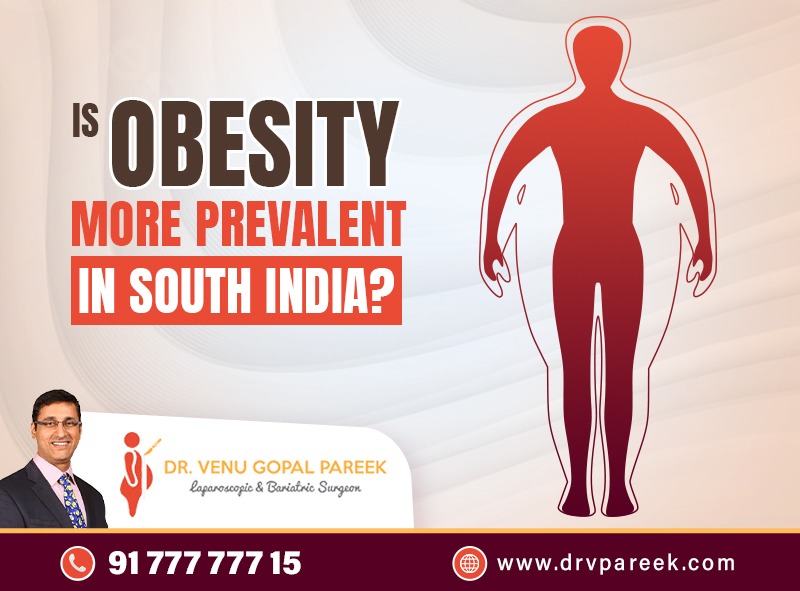
Is obesity more prevalent in south India?
Obesity is a complicated health problem that can be influenced by various factors such as genetics, lifestyle, and environmental factors. Although there might be regional differences in the prevalence of obesity within India, it is essential to keep in mind that the condition is becoming a more widespread public health concern across the whole nation.
Some studies suggest that the prevalence of obesity is more in some areas of South India compared to other areas of the country. A survey conducted by NFHS (National Family Health Survey) for 2015-16 demonstrated that the prevalence of overweight or obesity was significantly higher in south India than the national average. According to the data from the survey, the majority of obese people were noticed in Tamil Nadu (43.7%) followed by Karnataka (31.8%) and Andhra Pradesh (29.9%).
In another recent study which was held in 2018 and published in the Indian Journal of Endocrinology and Metabolism says that the incidence of obesity was higher in the southern states of Karnataka and Tamil Nadu.
All of these indicate that the prevalence of obesity in south India appears to be higher compared to the rest of the country.
It is important to note that along with genetics, lifestyle, and environmental factors, there may be other factors that can contribute to the risk of obesity development across regions of India, which include food habits and less physical activity levels. Furthermore, it is essential to know that obesity affects people in all communities and regions of India.
Dr. Venugopal Preek, the best weight loss surgeon in south India say that the main advice to address this issue is focusing on healthy lifestyles and improved access to healthcare resources all over the country.
Obesity
Obesity is defined as a condition where the excessive buildup of body fat is observed and it can harm a person’s health in many ways. Body Mass Index (BMI) is a common method used to measure obesity and it is calculated by dividing a person’s weight in kilograms by their height in square meters.
Obesity can trigger a wide range of health issues, which include:
- type 2 diabetes
- heart disease
- Stroke
- high blood pressure
- sleep apnea
- certain types of cancer.
Excess weight can also have an adverse effect on mental health, leading to depression and reduced self-confidence.
Obesity treatment involves a combination of approaches such as changes in diet, regular physical activity, and in extreme cases, weight loss surgery, also known as bariatric surgery is the best option. Treating obesity is very important in order to lower the risk of health problems related to it and improve overall health and well-being.
Role of bariatric surgery in obesity treatment
Bariatric surgery is of different types and the best treatment option used to treat obesity. The main goal of bariatric surgery is to help overweight or obese people to lose excess weight and to improve their quality of life.
Bariatric surgery is a kind of surgery that works by altering the stomach size and limiting the quantity of food that can be consumed in a single meal. This eventually helps in the reduction of calorie intake so that patients can achieve significant weight loss. The types of bariatric surgeries include gastric bypass, sleeve gastrectomy, adjustable gastric banding etc., and gastric balloon which is the latest non-surgical weight loss procedure.
Research by experts showed that bariatric surgery is the best alternative treatment for obesity, especially for people with high BMI (body mass index) i.e. over 35-40. It is also evident that bariatric surgery can result in considerable weight loss and the conditions connected to obesity such as type 2 diabetes, high blood pressure, and sleep apnea are getting better and a reduction in the risk of developing heart disease is observed.
However, bariatric surgery may not be a direct solution for everyone with obesity, so it needs to be carefully considered and discussed with a professional healthcare provider. It is important to remember that bariatric surgery is a major surgery and carries the possibility of risks and complications. Therefore, it is important for patients who want to undergo bariatric surgery to have a complete understanding of the procedure, the risks involved, and the post-surgery lifestyle changes that should strictly follow post-surgery to achieve long-term weight loss goals.
If you’re obese and looking for a safe and successful way to lose weight, consult Dr. V Pareek, one of the top weight loss surgeons in South India. With 17+ years of experience, he can provide you with the guidance you need to reach your weight loss goals. To make an appointment, call @9177777715 or book online.







